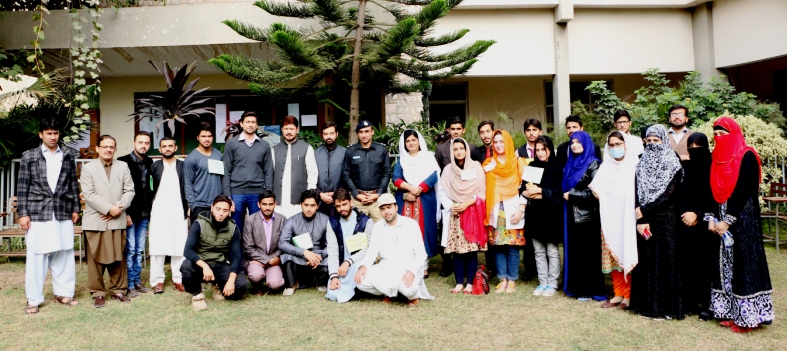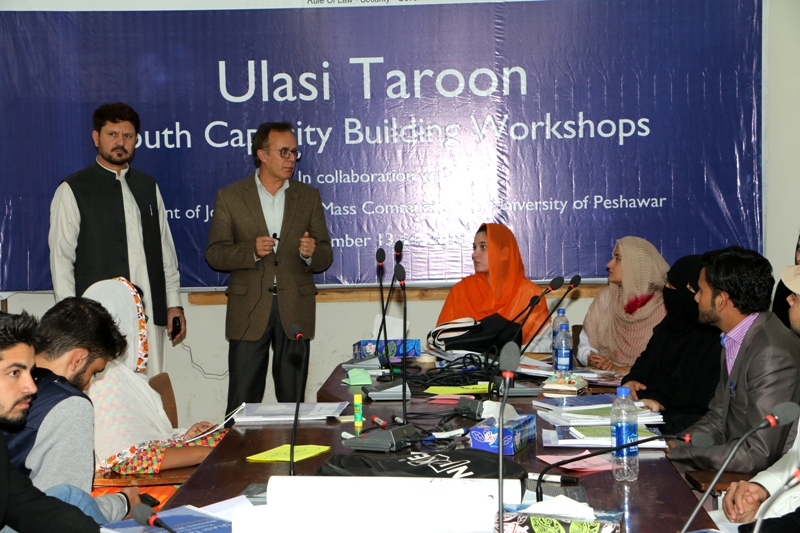Rule of law requires responsible citizenship says SP Cantt. Wasim Riaz
 Peshawar: The government should provide conducive environment to the citizens where they feel inclusion and interact with the government on the matters of public concern; articulating their issues in a dispassionate way. It’s only the vision of the leadership that steers the country towards the path of success, to the bright and connected future. Only by sensitizing, educating and enlightening the future leaders, inculcating the critical thinking skills among them and giving them opportunities for participation in the democratic processes, can we only have a visionary leadership tomorrow. The fundamental prerequisite for rule of law is social relations characterized by mutual respect and trust, that is only how it can contribute to social cohesion, and more the rule of law, more the social cohesion. As citizens, we can uphold rule of law by fulfilling our duties. Only by adhering to law, can we uphold rule of law.
Peshawar: The government should provide conducive environment to the citizens where they feel inclusion and interact with the government on the matters of public concern; articulating their issues in a dispassionate way. It’s only the vision of the leadership that steers the country towards the path of success, to the bright and connected future. Only by sensitizing, educating and enlightening the future leaders, inculcating the critical thinking skills among them and giving them opportunities for participation in the democratic processes, can we only have a visionary leadership tomorrow. The fundamental prerequisite for rule of law is social relations characterized by mutual respect and trust, that is only how it can contribute to social cohesion, and more the rule of law, more the social cohesion. As citizens, we can uphold rule of law by fulfilling our duties. Only by adhering to law, can we uphold rule of law.

These were the notions expressed by Mr. Wasim Riaz, Superintendent of Police, Peshawar Cantt. during the eleventh round of Ulasi Taroon, Youth Capacity Building Workshops organized by the Center for Research and Security Studies (CRSS) at the Department of Journalism and Mass Communication, University of Peshawar from November 13-14, 2018.
He added that among all the other types of justice systems, the retributive system is extremely important to create deterrence against crimes in the society. However, the restorative justice tends to be more efficient and cost-effective - than the traditional justice system - with the alternate dispute resolution system at the core but it cannot address the issues related to crimes in the society. The Dispute Resolution Councils (DRC) model in KP is a paragon of alternate dispute resolution system for other provinces. DRCs have demonstrated a proven ability to solve the disputes of civil nature. The rehabilitation should be considered as an important prong of justice system in Pakistan.
KP Police wants to engage youth in the community policing process and considers their role to be enormously important in addressing the public-police trust deficit and fighting crimes in the society.
Parliamentarian Sardar Hussain Babak, & former minister of education, said the solutions to all the problems in the society lie in democracy, its tenets and practices as democracy means delegation of power to the common citizens where the vote is the best indicator of power with the citizens. The role of media in strengthening democracy is crucial given it acts as mirror. For a good and effective democracy, there should be a balance of powers where the executive, judiciary and legislature only commit to execution, adjudication and legislation only. It’s a system of government that requires mutual respect not only among citizens of Pakistan but as global citizens too. It’s extremely important to have a rule of law and indiscriminate accountability for good governance. Every individual and organization is subject to law and accountability.
As public representatives, we must consider the national interest paramount than the personal. The collective responsibility and positive will once deployed can not only strengthen democracy but also ensure a bright future.
Mrs. Shagufta Khalique, an educationist, said that the peace and cohesion in a society are directly proportional to the level of access and security of human rights to the individuals. She noted that a balanced approach towards rights and responsibilities ensures a peace full and cohesive society.
While discussing identity and diversity, she said that diversity is a natural mosaic with each fragment having its individual identity that adds to the beauty of it. She said that instead of just focusing on the similarities, we must keep the differences in consideration with acceptance and respect. She added that in Pakistan diversity and its acceptance matters if we are dreaming of a cohesive society and united future. She stressed that critical thinking and cross-cultural interactions lead to the means of embracing diversity and make acceptance of differences easier. Each culture and faith is unique and if explored, one comes across many common grounds, so we must try to highlight the similarities instead of differences.
Mr. Malik Mustafa, Manager Programs, CRSS said that the society devoid of disparity, distinction, discrimination or any other divisive factors which engender divisions, distrust and conflict is known as a cohesive society. Social cohesion helps people to work together for the attainment of shared goals, designed and agreed upon to improve the living conditions for all. It ensures greater inclusiveness, more civic participation and creating opportunities for upward mobility. It is the glue that holds society together.
